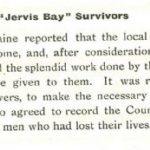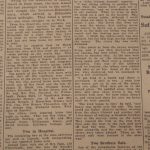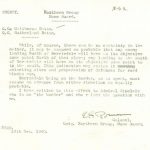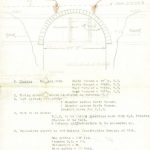On Monday 9 December British and Commonwealth Western Desert Force in Egypt launched Operation Compass, the counterattack against the Italian army. By the end of the week the Italian army had been decisively defeated, losing 38,000 prisoners, 400 artillery pieces and 50 tanks for the British loss of 133 killed, 387 wounded and 8 missing. The Italians now retreated into Libya.
 This week five of the nine Caithness survivors of HMS Jervis Bay, which had been sunk on 5
This week five of the nine Caithness survivors of HMS Jervis Bay, which had been sunk on 5  November sacrificing itself to give the convoy she was protecting time to scatter, returned home; they got back at about 2.30am. They’d missed the last train to Wick from Inverness, so they caught a train to Helmsdale which got in around midnight; and rather than stay the night there and come on next day, preferred to hire a car. Also this week, Wick Burgh Council resolved to “put on record the splendid work done by these men” and arrange for a civic reception: “It was also agreed to record the Council’s deep sympathy with the relatives of those men who had lost their lives.”
November sacrificing itself to give the convoy she was protecting time to scatter, returned home; they got back at about 2.30am. They’d missed the last train to Wick from Inverness, so they caught a train to Helmsdale which got in around midnight; and rather than stay the night there and come on next day, preferred to hire a car. Also this week, Wick Burgh Council resolved to “put on record the splendid work done by these men” and arrange for a civic reception: “It was also agreed to record the Council’s deep sympathy with the relatives of those men who had lost their lives.”
 Meanwhile, the Home Guard were considering the defence of Caithness in the event of a German invasion. With regard to Berriedale, “any enemy landing North of Berriedale will have as its objective some point North of that place; any landing to the south of Berriedale will have as its objective some point to the south … Berriedale being on the border, so to speak, must assume an advance from either direction as equally probable.”
Meanwhile, the Home Guard were considering the defence of Caithness in the event of a German invasion. With regard to Berriedale, “any enemy landing North of Berriedale will have as its objective some point North of that place; any landing to the south of Berriedale will have as its objective some point to the south … Berriedale being on the border, so to speak, must assume an advance from either direction as equally probable.”
Plans were drawn up for the demolition of Lybster Harbour Bridge in the event of an invasion. In January Lt  Sainsbury of the Royal Engineers wrote to Captain McHardy of the Home Guard to say that “All the explosives necessary for the demolition of LYBSTER HARBOUR bridge are now stored in one of the cupboards in the Drill Hall at Lybster”; the cupboard door was padlocked, and the local constable had one copy, the lieutenant the other. He prudently added, “Could you please also have a “No Smoking and no naked lights” notice put up in the room in which the cupboard is situated?”
Sainsbury of the Royal Engineers wrote to Captain McHardy of the Home Guard to say that “All the explosives necessary for the demolition of LYBSTER HARBOUR bridge are now stored in one of the cupboards in the Drill Hall at Lybster”; the cupboard door was padlocked, and the local constable had one copy, the lieutenant the other. He prudently added, “Could you please also have a “No Smoking and no naked lights” notice put up in the room in which the cupboard is situated?”
